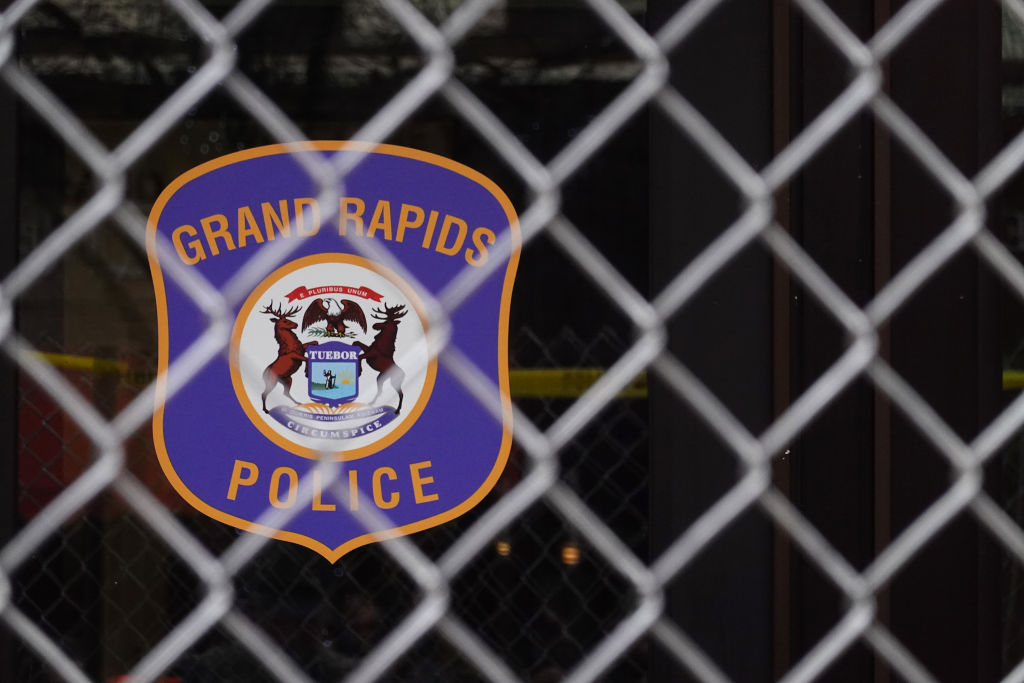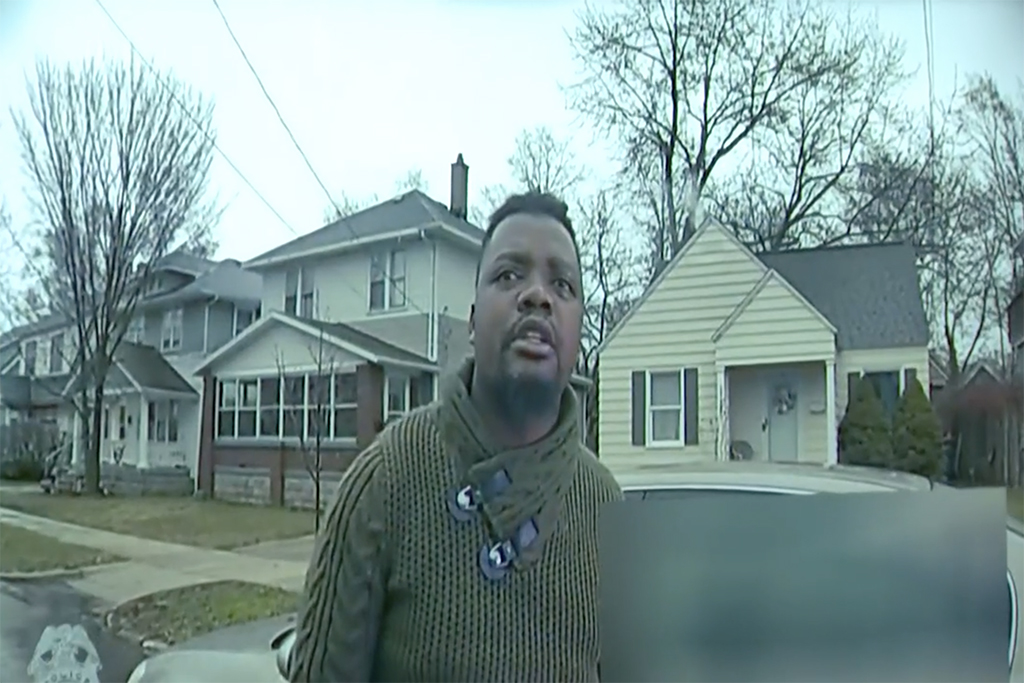
A fence surrounds the entrance to the Grand Rapids police station on April 14, 2022, following the killing of Patrick Lyoya in Grand Rapids, Michigan. | Source: Scott Olson / Getty
UPDATED: 2:00 p.m. ET, Dec. 7, 2022
Originally published on April 15, 2022
A new lawsuit in Michigan alleges a local police department’s culture of unchecked racism and discrimination in a case centered on the killing of an unarmed Black motorist during a traffic stop earlier this year.
The lawsuit was filed Wednesday by the family of Patrick Lyoya, a 26-year-old Congolese refugee who was shot in the back of his head at close range following a brief struggle with now-fired Grand Rapids police officer Christopher Schurr. Both the city of Grand Rapids and Schurr were named as defendants in the suit.
The legal developments draw attention to the Grand Rapids Police Department‘s long-established history of racially profiling Black people at gunpoint, especially children.
The lawsuit claims excessive force, alleging that “no reasonable officer would have responded to Patrick’s get away from a traffic stop as a reasonable basis to use deadly force.”
The family’s lawyers also wrote that “when he shot Patrick in the back of the head, Schurr had no information to support a reasonable suspicion that Patrick was dangerous.”
As part of another count, the lawsuit alleges a federal civil rights violation.
The lawyers claim the “city has a history of whitewashing excessive force cases and citizen complaints, and routinely fails to adequately discipline their offending officers, even when City has concluded that the officer violated its policies or procedures.”
The lawsuit cites an April 2017 study that showed “Black drivers were more than twice as likely than white drivers to be stopped by the City’s Police Department. Black people only make up 14% of the City’s population.”
The lawsuit goes on to allege that “in addition to failing to train, supervise, and discipline officers on the use of excessive force, City has an ongoing practice or custom of racial discrimination.”
Lawyers for the Lyoya family also allege the traffic stop that led up to the altercation was not “proper and lawful.”
Schurr violated federal law by using excessive force and broke Michigan law for gross negligence, the lawsuit also claims.
Video footage from the traffic stop strongly suggests Schurr used excessive force and never tried to de-escalate a situation in which he was the aggressor. Schurr was indicted for murder in June.

Patrick Lyoya is shown on bodycam footage during the fateful traffic stop. | Source: City of Grand Rapids
“Law enforcement officers in this country cannot continue to be absolved of accountability for shooting first and asking questions later,” civil rights attorney Ben Crump said in a statement sent to NewsOne. “The minor punishments officers often receive do not send a message that will deter other officers from repeating this deadly cycle. This pattern needs to end here with justice for Patrick Lyoya.”
The violent episode placed a bright spotlight on the Grand Rapids Police Department’s very real history of racial profiling and eagerly brandishing guns while disproportionately directing unwarranted brutality toward Black people in Michigan’s second-most populous city.
Honestie Hodges
The nation was previously reminded of the city’s police violence when a 14-year-old Black girl died from COVID-19 complications in 2020. Honestie Hodges’ life ended three years after she was the victim of state-sanctioned violence in Grand Rapids, where, as an 11-year-old, she was handcuffed at gunpoint while cops searched for a suspect in a stabbing. Video footage from the encounter showed Honestie sobbing and pleading while her grandmother yells for officers to acknowledge that she’s a child.
After several minutes, police removed the handcuffs once they realized they were wrong. Incredulously, the department later found that officers did not violate policy. In 2018, the Grand Rapids Police Department developed the “Honestie Policy,” a youth-interaction initiative that calls for fewer restrictions against children.
Targeting Black children
The same year Honestie was victimized by cops, the Grand Rapids Police Department allegedly racially profiled five unarmed Black teens by stopping and searching them at gunpoint. One of the teens was shown crying, according to video footage from the scene. Another teen comforted his crying friend by assuring him they would not die. At least two were handcuffed before all were released without any criminal charges.
The local news outlet MLive compiled a lengthy list of other instances of the Grand Rapids Police Department “pulling guns on minority residents,” including in 2018 when three Black boys — 11-year-old twins and a 17-year-old — were held at gunpoint while walking down the street. They were all handcuffed because police said they were suspected of having a gun. They were eventually released from custody with no charges.
Two months later that same year, Grand Rapids officers pulled a gun on a 12-year-old Black girl and frisked a 10-year-old Black boy following a shooting in which neither of them was involved.
Racial profiling
Fast-forward to last year and officers with the Grand Rapids Police Department mistook a Black man in a McDonald’s parking lot for a burglar and held him at gunpoint despite workers at the fast-food restaurant telling cops their suspect had just paid for a meal. Not to be deterred, the man was still charged with failing to obey the police and malicious destruction of police property.
That same month, Grand Rapids cops violently arrested a Black male motorist in a driveway where he was waiting for his wife to get inside the car so they could drive to a wake for his mother-in-law. In that instance, the cops also pulled out their guns and aimed them at the innocent man who officers said they confused for a different Black man driving a similar vehicle. Not only was the man still charged with resisting and obstructing but also he and his wife were forced to miss the wake.
Numbers don’t lie
Lyoya’s police killing came five years after data showed Black drivers were twice as likely to be pulled over by cops compared to motorists from any other racial background. Notably, just 18% of Grand Rapids’ population is comprised of Black people, according to U.S. Census data.
SEE ALSO:
Black Men And Boys Killed By Police
The post Patrick Lyoya’s Family Lawsuit Claims Grand Rapids Cops Have A Racist ‘Custom’: Here Are Some Examples appeared first on NewsOne.
Patrick Lyoya’s Family Lawsuit Claims Grand Rapids Cops Have A Racist ‘Custom’: Here Are Some Examples was originally published on newsone.com












